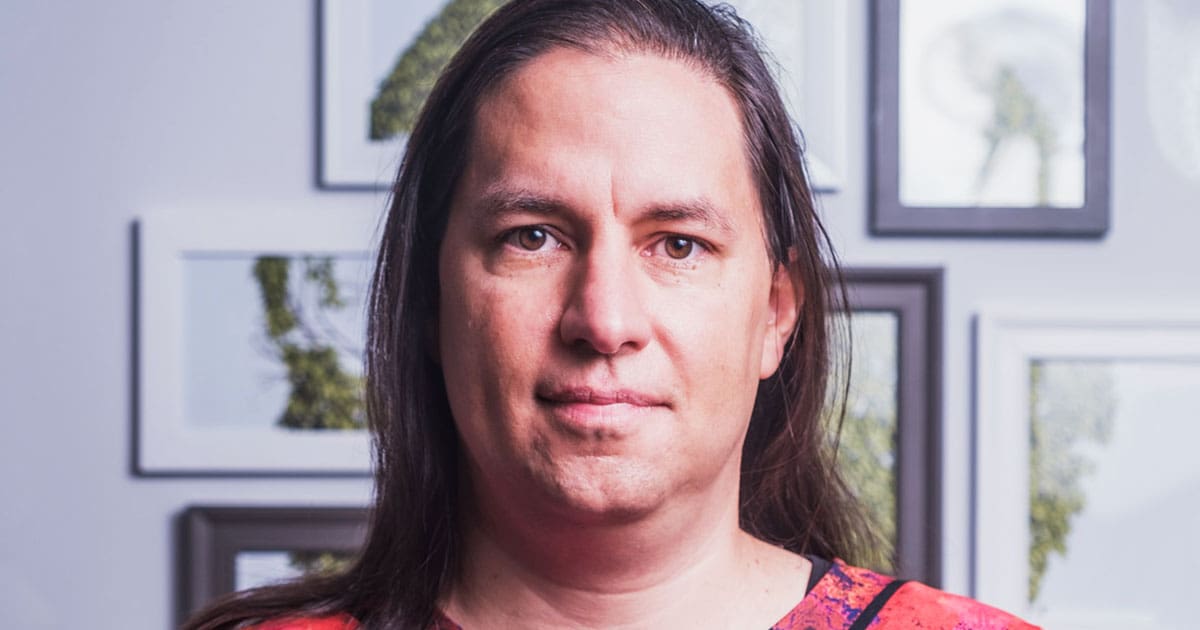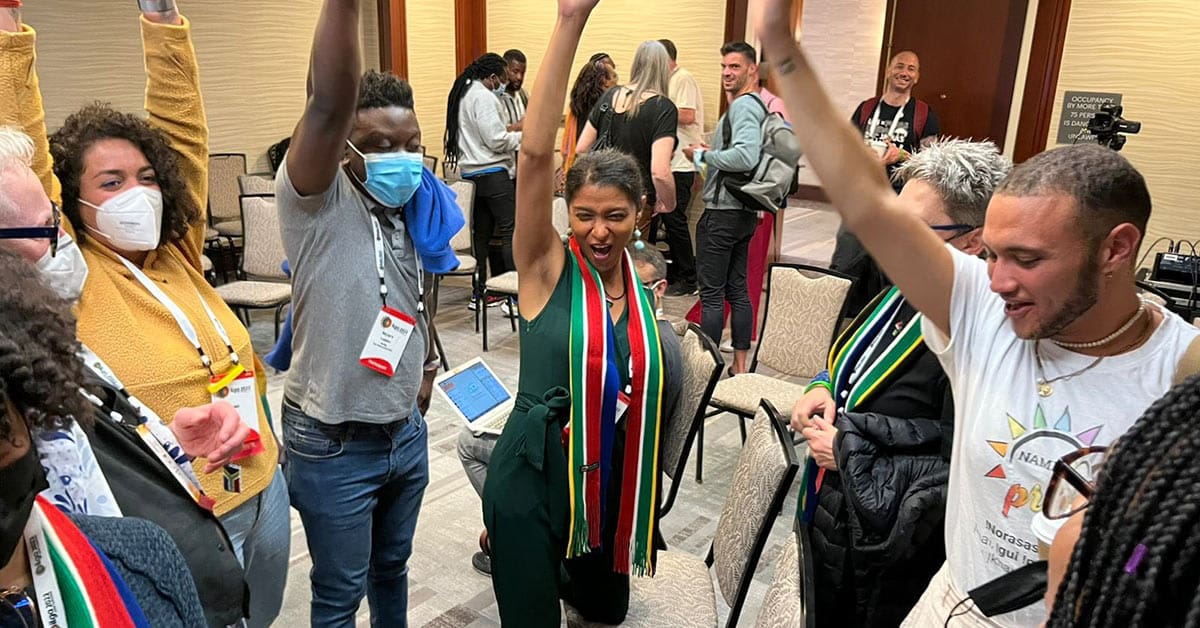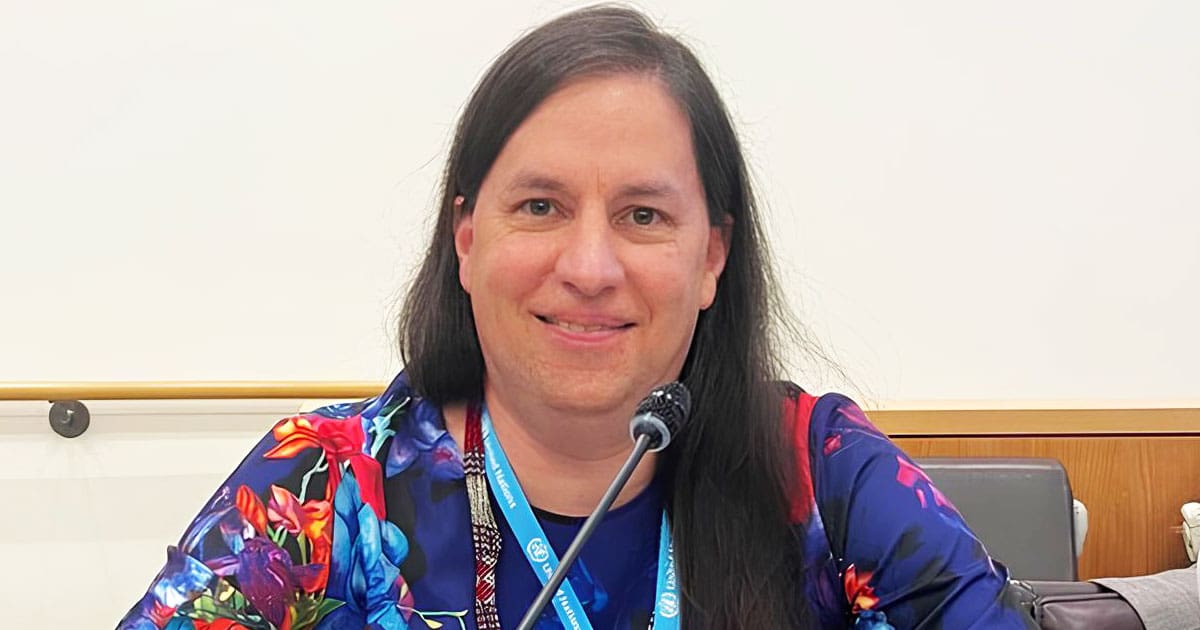Defending Global LGBTI Rights: ILGA World’s Julia Ehrt

Julia Ehrt, a former mathematician, is the Executive Director of ILGA World.
ILGA World, a federation of 2,000 LGBTI rights organisations from over 160 countries, is holding its 31st ILGA World Conference in Cape Town from 11 to 15 November.
Hosted by local groups Iranti and Gender DynamiX, the event will bring together voices from across the globe to confront the escalating pushback against LGBTI rights.
At the forefront of this effort is ILGA World’s Executive Director, Julia Ehrt, a dedicated LGBTI activist with a legacy of leadership in organisations like Transgender Europe.
With a background in mathematics and a commitment to human rights, Ehrt is working to forge a more resilient and inclusive future for LGBTI communities everywhere.
Ehrt, who lives with her partner and child in Berlin and Geneva, spoke to MambaOnline about her journey into advocacy, the importance of holding the conference in Africa, and her vision for combating the international anti-rights movement.
Thanks for talking to us, Julia. I was surprised to learn that you have a PhD in mathematics. What led you into the world of LGBTI advocacy?
It must sound like a stretch! So, I started in political activism when I joined University but that was not in queer context at all. But when I moved later to Berlin, that was in 2001, I had my coming out, and I dived into trans activism. I got involved in the European trans movement, with Transgender Europe (TGEU). Eventually, TGEU got money from the European Union, and that was for us, a game changer. I was working part-time as a math scientist at university, and part-time doing TGEU and I had to decide whether I would pursue an academic career or a career in civil society. At that point, it was clear that I would stop being a mathematician because, to be honest, I love doing math, but I didn’t want to do it all my life. It’s a very lonely science. I prefer engaging with people in real life. So, I became a full-time paid activist, a civil society leader, I suppose.
Which personal experiences influenced your advocacy or desire to go into advocacy?
I grew up in a very conservative small town in Germany, and then went to university in a slightly bigger town. And in my first semester, there was a nationwide university strike, and we took over the whole university for weeks. I think that politicised me in the sense of being part of political processes and later informed my decision to do this for a living because that is what I want to do; I want to have a say in, or I want to contribute to the way our societies unfold, and the conditions that we work in. Once I had my coming out as a trans person, seeing how trans people are treated in our societies, there was this glaring need to do this type of work. And of course, now I’m working not only on trans issues, but on LGBTI issues, embracing, the whole diversity and the breadth of our movement.
How would you compare the environment for a trans person coming out today compared to when you came out? Have things improved? Is the environment more accepting?
I would say definitely, yes. There’s a number of things that have gotten much better, but there are also things that, I would argue, got worse. When I came out more than 20 years ago, trans identities were basically nowhere in public discourse. Being a trans person was not even thought a possibility because the information was not available. The internet was just starting to be a mass medium. So, looking back for me, I think it took some time to realise that it’s possible that you have the ability to say, “I was assigned male at birth but that’s not a fit for me”. And now, even with all the discrimination and violence that LGBTI people still face, being queer is definitely a possibility that’s available in many countries of the world. Of course, there are parts of the world where this is definitely not possible. If you look, for example, to the Middle East, or many countries on the African continent, several countries in Asia, to some extent, the Caribbean, where violence and discrimination are so rampant and the lives of LGBTI people are very, very difficult to bear. But still, I think when you look over the long run, over decades, I think there’s a case to be made that the situation for LGBTI people has improved and that’s true for almost all regions in the world, not for all, but for almost all.
In what ways has it gotten worse?
With that visibility and that change in society, I think we’re now seeing a response from anti-rights and anti-gender actors. There’s a response of conservative, sometimes religious leaders trying to restrict the lives of LGBTI people, either through discriminatory practices or through criminalisation or through fostering prejudice and stereotypes against the communities that ILGA World serves. I see this very much as a response to the transformation that we’ve seen over the last 40 years.

Delegates celebrate Cape Town being named the 2024 ILGA World Conference host in Long Beach, California in May 2022. (Photo: Melusi Simelane)
We’ll get back to that later. On a practical level, what does ILGA World do to improve the lives of LGBTI people?
That’s, of course, a very complicated question, because ILGA World is kind of the global federation of LGBTI people. It’s kind of a little bit like that question; “so, what does the UN do in my life as an individual in country X”? Having said that, we work a lot with advocates in our communities and that has a direct impact on the lives of the communities we serve. I would say in a broad-brush strokes picture, we’re doing three important things. One, we make sure that sexual orientation, gender identities, gender expression, sex characteristics, as issues, are visible and present in international and global processes. So, for example, that has led to the UN creating an independent expert on sexual orientation and gender identity – a position held at the moment by Graeme Reid. It took 10 years, and ILGA World together with many other organisations actively advocated for this position to be created. The fact that sexual orientation and identity are visible in global processes helps international organisations and systems to put pressure on countries like Uganda, for example. And then, secondly, we create knowledge; we collect information, interpret and analyse mostly legal information, and make it available for our communities. We launched a database two years ago on the legal situation of LGBTI people across the globe. That helps to inform the work that our member organisations do. And then finally, we convene our movement, as we are doing in Cape Town. We’re a democratic organisation, so the convening is when we elect our board, define our strategy, and all of this. It’s also an occasion for cross-regional learning.
What is the significance of ILGA World hosting the conference in South Africa? What is its importance for Africa?
The first and the last of the ILGA World Conference on the African continent was in 1999 in Johannesburg – we haven’t been on the African continent for 25 years. So, bringing the conference and the global movement to the African continent is an end in itself. We are also bringing together activists from the Global South, in the Global South, in order to have South-South learning, because very often the ways how advocacy and change may be achieved in the Global North is unlikely to work in the Global South. And then, to also show that not all of Africa is hostile to LGBTI persons, it kind of pushes back on that narrative. I believe that it also pushes back against this notion of homosexuality being un-African. I think the symbolism of it is quite important – this is going to be the largest global conference we’ve ever organised. We’re going to have more than 1,000 people from more than 110 countries. In particular, for the activists that operate in extremely hostile environments, coming to a space where we hold the majority in itself can be transformational. Because you realise, we’re not fighting a lone fight. We are actually many and that is extremely powerful.
There has been criticism that the registration fees are exclusionary for South African and African activists.
Yes, the conference is exclusionary – there’s a truth in that, in particular for local communities, because it is expensive. On the other hand, the fees for local communities are by far the lowest and are heavily subsidised by us. It’s like 425 US dollars, which, of course, in South Africa, is a lot of money. But the actual cost of the conference for us is a lot higher than that. If you organise a global conference on this scale, it’s kind of inevitable that it creates tensions of this nature, in particular in countries in which economic disparities are like they are in a country like South Africa. And there’s no right or wrong answer in this. It’s about finding a balance. There’s a lot of sympathy from our end. We’re trying to find ways on how to bring, [more] locals to the conference.
Getting back to the anti-rights and anti-gender movements that are growing in South Africa and across Africa. Why do you think they’re gaining traction?
These movements are not only gaining traction on the African continent but pretty much across the globe. We are seeing very similar actors, arguments and activities from anti-rights actors in all world regions. I think what is certain is that anti-rights actors are globally networked, and they are extremely well-resourced. I also think those movements are gaining traction because conservatism as such, is gaining traction globally. And LGBTI people are easy to use to drive stigma and to connect to a conservative understanding of the world as being perverse, immoral, inappropriate, dangerous. I think the anti-rights movement has identified that as a strategic tool to harness political strength. I think another big, big topic is the question of migration and refugees. It boils down to an understanding of ‘us first’ which, of course, has been perfected in the US. And that resonates with people, who are under economic pressure, and who do not know how to make ends meet at the end of the month. Our opponents have become more strategic. I wish to believe it’s because they’ve been losing ground over the last 30 years, so they had to shift strategies, and are now becoming more effective in pushing back against developments around social Justice and increased diversity of societies. And that directly, of course, connects to the question of keeping democracies afloat, because, as a friend recently said to me, if you’re part of the social mainstream, authoritarianism might not be that frightening. [But] if you’re part of a minority, be that a gender minority, sexual minority, an ethnic minority, then authoritarianism is actually possibly life-threatening.

“We need to find ways of maintaining a human rights agenda, but also finding different ways of telling our stories,” says Julia Ehrt
I sometimes get quite despondent at the response we get when we publish stories around trans-related topics, in particular the issues of changing rooms and bathroom access, inclusion in sports, and gender-affirming treatment for young people. Those seem to be things that many people react to in a very emotional and negative way. Do you have any thoughts about how we can change those hearts and minds beyond, you know, presenting human rights arguments that can seem quite disconnected from non-LGBTI people’s lives?
That’s the million-dollar question! I think we’re at an inflexion point in the sense that the LGBTI movement has made incredible achievements on a human rights agenda over the last 30 years. So, we’ve used human rights-based arguments in every way, shape or formula, to make the case, which has worked, although not everywhere. But that doesn’t change a lot of minds. These legal arguments have their limits. We need to find ways of maintaining a human rights agenda, but also finding different ways of telling our stories. We need to shift the way we speak about us, and I think the way we, and others, are trying to do that is to find the right story to tell; it’s a story of the person who happens to be gay going about their lives. So, to give you an example; the public campaign in the [2015] referendum in Ireland for marriage equality.
I believe that was the first time the issue of marriage equality was supported through a national referendum.
Which, of course, is a totally bad idea. I mean, no minority issues should be put to a public vote. But anyway, those were the rules in Ireland. So they had a campaign called the ‘Yes Equality’ campaign, and it led to the majority voting in favour of marriage equality. So how did they do that? They did away with all the legal arguments. They went to mothers, grandmothers, sisters, family members, and friends, to be the face of the campaign for marriage equality and made it around love and made it around family values. Their campaign was not about, “We should have the right to be married because everyone else can get married”, it was around, “My brother wants to marry the love of his life, and he can’t” or “My grandchild is suffering because of being queer”. It worked because all of us, we’re also friends, daughters, sons, sometimes parents. And I think that speaks to people, and that speaks to the mainstream. We need to have more of that. Coming back to what I said earlier about bringing the conference to the African continent, it’s about saying that queer persons have existed on the African continent even before the colonisers came. And actually, the colonisers, what they brought was Christianity and a very rigid understanding of how gender unfolds in a binary system. And that was the import, and again, that’s a story that is much easier, relatable in many contexts than to say, well, there’s a Universal Declaration of Human Rights that guarantees our rights.
What would you like to see come out of the ILGA World Conference in Cape Town? What impact would you like it to have?
In the vein of what we’ve just been discussing, I think positive stories. I think a story that narrates the breadth of the African movement and how much the global movement has been welcomed in Cape Town. If that’s an outcome, that would be phenomenal. And I mean, if activists come to Cape Town and go home with a sense of being energised, and with a sense of, “I’ve learned something that speaks to me and the work that I do and gives me tools or ideas of what I could do better”, that’s also an outcome that I would hope for.
The 31st ILGA World Conference takes place in Cape Town from 11 to 15 November 2024. A constellation of other events will happen during and around the conference — including the inaugural International Pride Awards, a joint project by ILGA World and UNDP, and a strategic summit for intersectional and inclusive democracies. MambaOnline is a media partner of the ILGA World Conference.
Leave a Reply